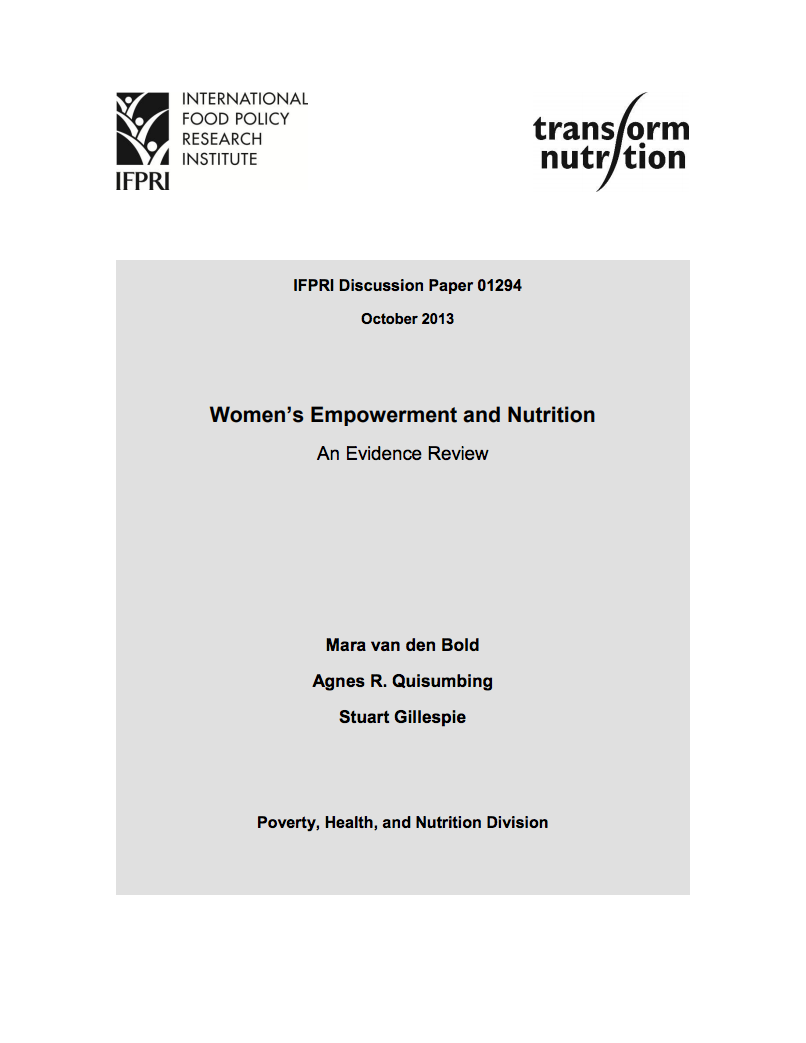Focal point
Location
About IFPRI
The International Food Policy Research Institute (IFPRI) provides research-based policy solutions to sustainably reduce poverty and end hunger and malnutrition in developing countries. Established in 1975, IFPRI currently has more than 500 employees working in over 50 countries. It is a research center of theCGIAR Consortium, a worldwide partnership engaged in agricultural research for development.
Vision and Mission
IFPRI’s vision is a world free of hunger and malnutrition. Its mission is to provide research-based policy solutions that sustainably reduce poverty and end hunger and malnutrition.
What We Do
Research at IFPRI focuses on six strategic areas:
- Ensuring Sustainable Food Production: IFPRI’s research analyzes options for policies, institutions, innovations, and technologies that can advance sustainable food production in a context of resource scarcity, threats to biodiversity, and climate change. READ MORE
- Promoting Healthy Food Systems: IFPRI examines how to improve diet quality and nutrition for the poor, focusing particularly on women and children, and works to create synergies among the three vital components of the food system: agriculture, health, and nutrition. READ MORE
- Improving Markets and Trade: IFPRI’s research focuses on strengthening markets and correcting market failures to enhance the benefits from market participation for small-scale farmers. READ MORE
- Transforming Agriculture: The aim of IFPRI’s research in this area is to improve development strategies to ensure broad-based rural growth and to accelerate the transformation from low-income, rural, agriculture-based economies to high-income, more urbanized, and industrial service-based ones. READ MORE
- Building Resilience: IFPRI’s research explores the causes and impacts of environmental, political, and economic shocks that can affect food security, nutrition, health, and well-being and evaluates interventions designed to enhance resilience at various levels. READ MORE
- Strengthening Institutions and Governance: IFPRI’s research on institutions centers on collective action in management of natural resources and farmer organizations. Its governance-focused research examines the political economy of agricultural policymaking, the degree of state capacity and political will required for achieving economic transformation, and the impacts of different governance arrangements.
Research on gender cuts across all six areas, because understanding the relationships between women and men can illuminate the pathway to sustainable and inclusive economic development.
IFPRI also leads two CGIAR Research Programs (CRPs): Policies, Institutions, and Markets (PIM) andAgriculture for Nutrition and Health (A4NH).
Beyond research, IFPRI’s work includes partnerships, communications, and capacity strengthening. The Institute collaborates with development implementers, public institutions, the private sector, farmers’ organizations, and other partners around the world.
Resources
Displaying 446 - 450 of 15212013 Indice globale della fame : La sfida della fame : Sviluppare la resilienza delle comunità per la sicurezza alimentare e nutrizionale
Nel 2012 la tempesta tropicale Isaac e l’uragano Sandy hanno martoriato Haiti, danneggiando i raccolti, facendo straripare i fiumi, allagando le strade e bloccando l’accesso alle comunità. Mentre i prezzi alimentari aumentavano e i debiti crescevano, gli haitiani poveri hanno adottato misure estreme. Alcuni sono emigrati. Altri hanno resistito riducendo il numero di pasti al giorno e svendendo le proprie terre o il bestiame. Ogni estate, gli haitiani temono lo scatenarsi della furia degli elementi.
2013 Indice globale della fame : La sfida della fame : Sviluppare la resilienza delle comunità per la sicurezza alimentare e nutrizionale
Nel 2012 la tempesta tropicale Isaac e l’uragano Sandy hanno martoriato Haiti, danneggiando i raccolti, facendo straripare i fiumi, allagando le strade e bloccando l’accesso alle comunità. Mentre i prezzi alimentari aumentavano e i debiti crescevano, gli haitiani poveri hanno adottato misure estreme. Alcuni sono emigrati. Altri hanno resistito riducendo il numero di pasti al giorno e svendendo le proprie terre o il bestiame. Ogni estate, gli haitiani temono lo scatenarsi della furia degli elementi.
2013 Indice globale della fame : La sfida della fame : Sviluppare la resilienza delle comunità per la sicurezza alimentare e nutrizionale
Nel 2012 la tempesta tropicale Isaac e l’uragano Sandy hanno martoriato Haiti, danneggiando i raccolti, facendo straripare i fiumi, allagando le strade e bloccando l’accesso alle comunità. Mentre i prezzi alimentari aumentavano e i debiti crescevano, gli haitiani poveri hanno adottato misure estreme. Alcuni sono emigrati. Altri hanno resistito riducendo il numero di pasti al giorno e svendendo le proprie terre o il bestiame. Ogni estate, gli haitiani temono lo scatenarsi della furia degli elementi.
Democratic Republic of Congo
T he Democratic Republic of Congo (DRC) committed to the mitigation of the effects of climate change by signing the Kyoto Protocol for climate change and other related environmental management protocols. Since 1994, DRC has produced two national climate change communication documents (RDC, Ministère de l’Environnement, Conservation de la Nature, Eaux, et Forêts 2001; RDC, Ministère de l’Environnement, Conservation de la Nature et Tourisme 2009).
Women’s empowerment and nutrition: An evidence review
This paper starts by reflecting on the concept and measurement of women’s empowerment and then reviews some of the structural interventions that aim to influence underlying gender norms in society and eradicate gender discrimination. It then proceeds to review the evidence of the impact of three types of interventions—cash transfer programs, agricultural interventions, and microfinance programs—on women’s empowerment, nutrition, or both.





